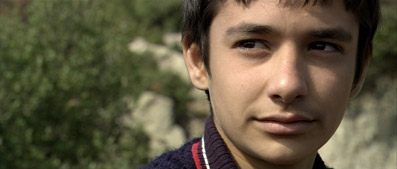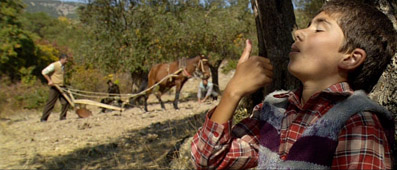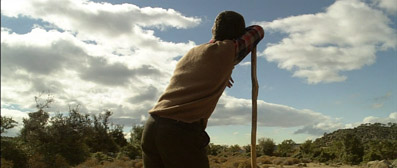|
If the idea of life in a remote Turkish mountain village sounds rather idyllic, then the first fifteen minutes of Reha Erdem's Time & Winds [Bes vakit] should prompt a swift rethink on the matter. As the film begins, young Ömer is disrupted from his dreamy appreciation of the sounds of the night by his violently coughing father, the local imam (holy man), and is sent to ask a neighbour to sing the call to evening prayer in his sick father's place. "Don't get too excited," his friend Yakup advises, "He'll get better." The following day, an old woman reflects on how the men in her family have always taken out their frustrations on their own children, while at school two of the pupils are sporting the scars of just such a parental aggression. That evening, the local doctor advises Ömer's father to stay out of the cold if he is to protect his weak chest, information that prompts Ömer to creep downstairs during the night and open a window to allow the night air to blow onto his sleeping father's head. The wind that seemed so tranquil in the film's opening shot suddenly takes on a more threatening aura.
This may play at first like a low-key study of rural parental abuse, but there's more going on here than a few angry men who smack up their kids. Ömer's apparent hatred of his father, for instance, appears to stem not from repeated beatings, but from jealously of his younger brother Ali, on whom both parents dote and whose progress at school they use to highlight Ömer's own academic failings. His friend Yildiz may have a far better relationship with her openly affectionate father, but she is put upon in a different way, with the repeated absence of both parents requiring her to take on many of their duties, including the care of her baby sister. The more simple-minded Yakup, meanwhile, has a thing for his pretty female teacher, and his father's angry insistence that he wash properly before meals stems not from ill temper, but from his son's refusal to clean a thumb that bears a small spot of the teacher's blood, picked up when he removed a thorn from her foot on a school field trip.

As a coming-of-age story, Times & Winds has some familiar touchstones. The kids (two of whom are secret smokers) are amused at the sight of animals fornicating, but catching her parents in the act proves a distressing moment for Yildiz, while Yakup's schoolboy crush on his teacher is a bubble just waiting to be burst. But even these elements are imbued with a freshness by the unfamiliar surroundings, the naturalistic performances of the kids (none of whom are actors, but who nonetheless have a winning way with expression and restrained emotion), and Erdem's refusal to over-dramatise moments that plenty of less restrained filmmakers would make an emotional meal of.
The story is light on traditional narrative arcs – no bad thing in my book – the emphasis instead being on exploring the experience of being a pre-adolescent child in a community that expects even the young to behave and think like adults. There's a pragmatism to this attitude in a village that needs to be self-supporting and where every citizen is required to contribute to the upkeep of the whole. This collectivist approach is clearly a positive thing – the community takes joint responsibility for repair to damaged houses, and slaughtered meat is evenly distributed to those in need – but one whose demands can put a considerable strain on the family unit. The sometimes harsh relationship between parent and child is shown to be one that has passed down through the generations, most evident in the attitude of Yakup's grandfather to the two adult sons he repeatedly berates and belittles, prompting them to hang their heads in shame and reducing Yakup's father to tears.
Broken up into five chapters named after the times of Islamic call to prayer – Night, Evening, Afternoon, Midday and Morning (the original Turkish title translates literally as 'Five Times') – the film looks and sounds ravishing. Florent Herry's consistently gorgeous scope cinematography and Arvo Pärt's melancholic orchestral score enlarge a small story to big picture proportions in a way that Hollywood once excelled at, but with the sort of understated approach to the drama that has characterised much of the best of recent Turkish cinema. The scope frame, a seemingly unusual choice for a small scale and intimate portrait, is most effectively used to both isolate characters and unify them as a group (the scene in which one of the villagers is brought before the male elders to answer for beating an orphan boy in their care includes excellent examples of both), or to dwarf them against the landscape in which they work to survive. The camera movements are also seductive, with long steadicam follow shots that chase after the children (and in one case two of the adults) as they walk or run through the village on a variety of errands and tasks, and a breathtaking float up to the high platform of the mosque tower where the call to prayer is being sung.

If there's an element of the film I remain unsure of, it's the intermittent still life compositions of the children – individually for the most part but on one occasion together – lying in positions of sleep or, more likely, death. Given that these are clearly not real events within the narrative or even future visions, their function is clearly symbolic, and as the film progresses there is a strong suspicion that they are designed to represent the passing of aspects of childhood innocence (Yakup is so framed after discovering something upsetting about his father, for example). If so, then it's seriously overstating a point made perfectly well by the drama itself; that these moments do no serious harm is because, like the rest of the film, they are so exquisitely handled.
There's no doubt that the technical beauty of Times & Winds contributes a great deal to its hold, but there's so much more to the film than its good looks and ear-stroking soundtrack. Erdem repeatedly connects us to the feelings of his young protagonists on a level that transcends specific experience and taps most effectively into our own emotional recollections. I may not have grown up in a mountain village or have ever harboured patricidal fantasies, but all these years later I still remember vividly the confusion, the pain and the wonder of being at this transitional age. On the evidence of Times & Winds, I'm clearly not alone.
A lovely 2.35:1 anamorphic transfer that does full justice to Florent Herry's fabulous cinematography. The contrast is spot on and the black levels pitch perfect without loss of shadow detail, and the picture has a crisp sharpness that upscales most impressively to HD. The colour reproduction is excellent, with the flesh tones naturalistic and the blue of the school uniforms popping out against greenery of the countryside of the pastels of the buildings.

The familiar Artificial Eye audio options of Dolby stereo 2.0 and surround 5.1 are present and there's no real contest here – the stereo track is perfectly serviceable, but the music is fuller and the location effects (wind, rain and thunder in particular) are far more inclusive on the 5.1. As you'd expect of a recent film, the clarity and range are impressive on both tracks.
Interview with Reha Erdem (18:22)
Erdem kicks off in Turkish with his voice drowned out by that of the in-the-room translator, but he then bravely decides to give his English a go, and apart from a few struggling moments, that's how most of the interview is conducted. As interesting as you'd expect (or at least hope), particularly for the information on the film's preparation and shooting and on the director's approach to filmmaking (he makes storyboards but doesn't stick to them and likes what he calls 'artificial' cinema). The news that his fondness for the village in which the film was shot has prompted him to buy a house there brought a smile to my face.
Trailer (2:04)
A well cut trailer whose choice of music gives the whole thing a sinister edge. It's interesting to watch after seeing the movie as a demonstration of how editing can change our perceptions of a story or character, with dialogue given new meaning by being redirected at different characters and events than they were in the film.
Describing any film as having poetic qualities is in danger of becoming redundant through overuse, and I know I'm as guilty as anyone on this, but there are occasions when it's wholly appropriate and this is certainly one (if you're looking for a second opinion then try doing an internet search for "Reha Erdem poetry" and see how many of the top hits feature this film). Times & Winds looks and sounds wonderful and has a pace that most appropriately matches the lives of the people it portrays, but the characters are always its central focus and its for that it should be celebrated. The included interview is pretty good, but it's the transfer that will sell the disc. Recommended.
|